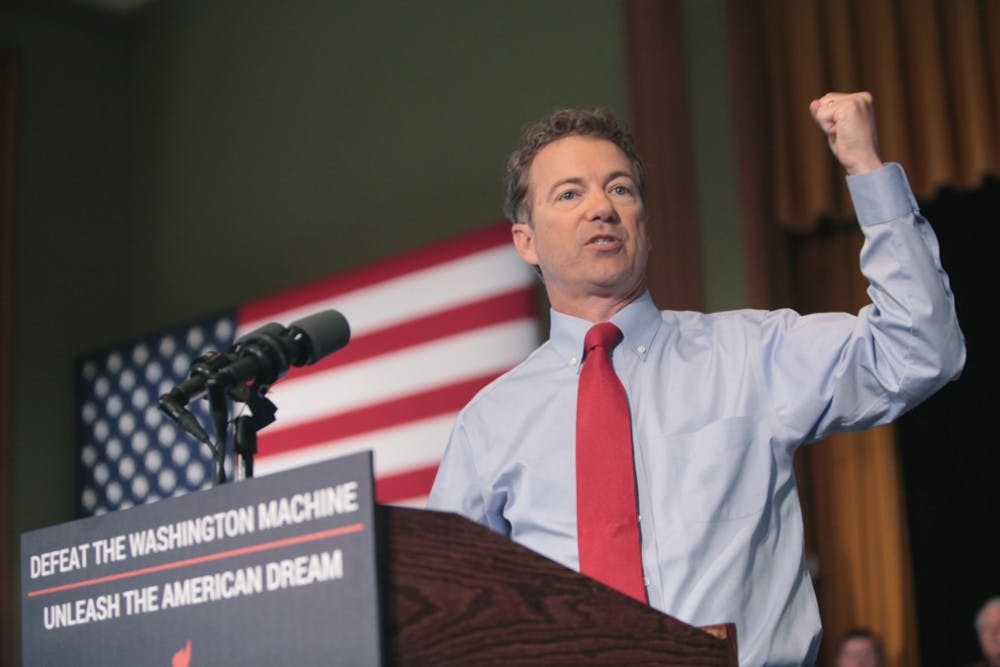By Joe Friedrichsen | Echo
[caption id="attachment_8563" align="aligncenter" width="630"] Clinton announced her presidential candidacy in a low-key launch video (Photograph provided by wikimedia commons user, defenseimagery.mil)[/caption]
Clinton announced her presidential candidacy in a low-key launch video (Photograph provided by wikimedia commons user, defenseimagery.mil)[/caption]
Presidential hopefuls are gearing up for Decision 2016. So far, four candidates have announced their decisions to run in four unique ways. Here's an evaluation of each candidate's launch strategy:
Ted Cruz (Republican)
Cruz became the first Republican to throw in his name when he formally announced his candidacy on March 23. The New York Times reported that financial urgency prompted the decision to announce early. Cruz intends the early-bird announcement to draw political support from the GOP right wing and also grant him greater financial resources-a good calculation on his part.
He announced his candidacy on Twitter around midnight the day before he spoke at Liberty University in Lynchburg, Virginia. His decision to speak at a private, conservative Christian college showed that he wants to be perceived as a Christian evangelical and liberty candidate. While that image will certainly appeal to some voters, the exclusivity of Cruz's speech and the focus on Tea Party conservatives is problematic. Cruz will need to widen his appeal beyond right-wing Republicans if he hopes to outpace candidates like Rand Paul and Hillary Clinton.
Our grade: C
Rand Paul (Republican)
Hoping to fare better than his father Ron Paul-who made three unsuccessful bids for the White House-Rand Paul seeks an inclusive and conservative vision for America. Paul chose the Galt House Hotel in Louisville, Kentucky, as the stage for his campaign launch.
Behind Paul in the dimly lit backdrop stood African Americans, women and young adults-showcasing his targeted demographics. POLITICO reported that Paul's staging choice illustrates the challenge of broadening his conservative base while seeking to enhance his standing among young and minority voters who tend to vote for Democrats.
Paul's launch speech effectively positioned him as an anti-establishment figure who promises to be a different kind of Republican and certainly a different kind of Paul. The speech itself felt presidential. Because Paul didn't completely lambast Obama or Democrats, he avoided being seen as a protest candidate. Instead, he articulated a clear and detailed alternative vision for America.
Our grade: A-
Hillary Clinton (Democrat)
While Republican contenders explode out of the gates in front of roaring crowds, Clinton opted for a more subtle launch by posting a short video to YouTube and Twitter, which can be viewed on her campaign page. The ad-like video portrays a wide cross-section of Americans in different occupations and stages of life. Interestingly, Clinton herself doesn't appear until late in the video. The decision to put Clinton in the video's background appears to be a part of her campaign strategy, as POLITICO reported.
Even so, Clinton's video immediately generated social media buzz, the Huffington Post reported. Perhaps it succeeded because the video's short length made it attractive to young, Twitter-using voters.
Though policy isn't mentioned in the video, it's hardly missed because America is already familiar with her views. The more pressing issue for Clinton is shattering the popular perception of her being cold and disconnected from everyday American life. Apparently recognizing that problem, the video at one point puts Clinton in the foreground of a suburban landscape. In short, Clinton's use of an incumbent-like strategy is smart and could see huge payoffs in the future.
Our grade: A
Marco Rubio (Republican)
Marco Rubio, the son of Cuban immigrants, staged his speech at the Freedom Tower in Miami, Florida-explaining that it symbolizes America's identity as the land of opportunity. That symbol provided the framework for Rubio's speech. He credited America's freedom and exceptionalism for changing his family's future.
But Rubio also stated that Americans doubt the possibility of achieving the American dream.
He sells himself as the candidate to restore that dream for future generations.
Rubio quoted Scripture in an appeal to Christian voters-echoing other Republican candidates' overtures to Christians. Rubio also took a shot at Clinton's policies, saying they're "stuck in the 20th century." But Rubio arguably advocates for outdated foreign policies himself. He opposes lifting the embargo on Cuba and supports the continuing antagonism toward Iran and Russia.
Despite Rubio's policy hypocrisy, there were some redeeming characteristics to his launch. The venue choice complimented Rubio's campaign theme-giving his message some extra force. Rubio's vision of restoring America appeals to a broad base, including Republican moderates. This could put him on a track to make a strong push for the Republican nomination.
Our grade: B-




